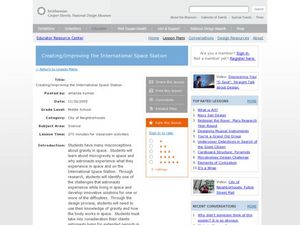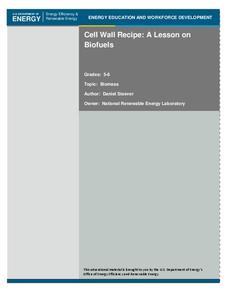Chicago Botanic Garden
Review and Assessment: Causes and Effects of Climate Changes
The last activity in the series of five is a short one where individuals show what they've learned about the causes and effects of climate change. Working independently, they fill in a graphic organizer, then compare their notes with a...
Curated OER
Water Lesson Plan
Students discuss the importance of water in our daily lives. In this physics instructional activity, students calculate the pressure of water tower systems. They investigate the effect of certain variables using a computer simulation.
Curated OER
Science and Art Museum
Imagine each one of your learners on task and interested in scientific material. Learners investigate science related art by creating a small museum! Using digital cameras, pupils photograph different scientific actions that look...
Curated OER
The Science of Respiration and Blood Circulation
Fifth graders study how respiration and circulation are connected. In this respiratory lesson plan students complete several activities to better understand heart rate and carbon dioxide in the body.
Curated OER
The Five Senses
Study various objects and help kindergarteners use their five senses to classify the objects. They are presented with various objects and then use their five senses to sort and classify the objects. Then they use a Visual Ranking Tool to...
Curated OER
Sustainable Southern Belize: Coral Health Lesson Plan
Fifth graders investigate coral reefs and the dangers they face by labeling and drawing. In this oceanography lesson, 5th graders view a PowerPoint presentation of photographs of coral reefs in Belize. Students investigate...
Curated OER
Waves Lesson Plan
Pupils demonstrate an understanding of tsunamis and possible causes. In this investigative instructional activity students view a video and explore earthquakes and movement of tectonic plates.
American Institute of Architects
Architecture: It's Elementary!—Fifth Grade
Young citizens construct an understanding of urban planning in this cross-curricular unit. Covering every aspect of city development from the political, economic, and social influences to sustainable building practices, this...
Curated OER
Paper Suspension Bridges: You Want Me To Go Up There?
A few class periods will be required to complete this physics investigation with your high schoolers. There is an unavailable video written into the lesson plan, but there is plenty of material here to bridge the gap. Two terrific...
Space Race
Sensory Detectives
Test your learners' sensory awareness with three hands-on activities that ask pupils to use their other senses to identify and describe everyday objects hidden from sight.
Curated OER
Energy Resources: Where Are They and How Do We Get Them?
Future energy engineers visit several stations, each one dedicated to a different alternative source of energy. They describe how solar energy is converted into other forms of energy, the patterns of distribution of energy resources in...
Curated OER
Insects A-Z!
Alphabet insects! Who has ever heard of such a thing? Get ready because your class is going to research insects that start with a specific letter of the alphabet. In small groups, they'll use the Internet and reference texts to locate...
Virginia Polytechnic Institute and State University
Lesson Plan: Omelet Cooking Principles
Although designed for a foods lab, the information in this resource might be just the thing for your own recipe notebook. Illustrated, step-by-step directions for making the perfect omelet, egg-citing puzzles, games, and even...
Channel Islands Film
Arlington Springs Man: Lesson Plan 1
Learning to craft quality questions is a skill that can be taught. Class members use the Question Formulation Technique to learn how to create and refine both closed-ended and open-ended questions. They then view West of the West's...
Curated OER
Conservation of Mass
High schoolers conduct an experiment to compare the total mass of products to the mass of reactants. In this conservation of mass lesson plan, students devise an experiment to show that matter is neither created or destroyed in a...
Curated OER
Creating/Improving the International Space Station
Students research space and gravity and understand the difficulties humans have while on the International Space Station. In this space lesson plan, students listen to personal accounts of astronauts on videos and present designs to...
American Chemical Society
Energy Changes in Chemical Reactions
Some chemical reactions produce heat, but what is really going on? Lesson focuses on the concept of energy changes, both exothermic and endothermic. Scholars perform multiple experiments, hands-on activities, and view videos of the...
University of California
You Are What You Eat: Testing for Organic Compounds in Foods
We have all heard that we are what you eat, but what are we eating? An informative lesson opens with a discussion of the foods pupils have recently eaten. Then, young scientists perform four experiments on seven...
Science Matters
Formative Assessment #4: Body Chart
The body is one big life-sized puzzle! A hands-on lesson builds on the idea and has individuals create life-size models of the body including all important organs of the digestive, circulatory, and respiratory systems. After building...
Curated OER
Cell Wall Recipe: A Lesson on Biofuels
Biotech engineers discover that changes in the DNA code for cell wall formation can help create crops better suited for biofuel production. They extract DNA from wheat germ. They decode paper strips with codes and relate the activity to...
Curated OER
High-Tech Food: Science in Your Shopping Cart
Kids are given a lot to think about, as they delve into the world of high-tech foods. They discuss GMOs, biotechnology, food enhancements and domestication. They view videos, engage in class discussions, complete worksheets, and learn...
American Chemical Society
Neutralizing Acids and Bases
Most things naturally strive for balance, and acids and bases are no exception. Neutralization of acids and bases allows scholars to explore the color changes associated with the pH scale. After this exploration, pupils neutralize two...
EduGAINs
Go H2O! Investigating Residential Water Systems
Before your learners excuse themselves to get a drink at the water fountain, prompt them to think about where that water comes from. A middle school science lesson encourages groups to research their community's source of drinking water,...
Virginia Department of Education
Metamorphic Rocks
Rocks can bend? Pupils investigate how heat and pressure produce metamorphic rocks by modeling them using clay, and then categorize samples based on observable characteristics. The lesson ends with a metamorphic rock identification...























